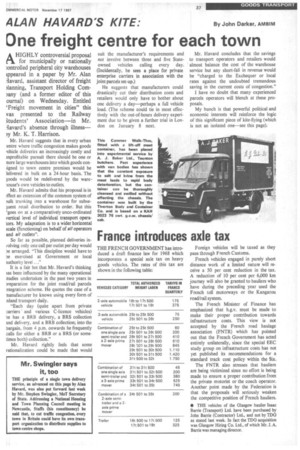ALAN HAVARD'S KITE: By John Darker, AMBIM
Page 39

If you've noticed an error in this article please click here to report it so we can fix it.
One freight centre for each town
AHIGHLY controversial proposal for municipally or nationally ontrolled peripheral city warehouses ippeared in a paper by Mr. Alan lavard, assistant director of freight )1anning, Transport Holding Corn)any (and a former editor of this ournal) on Wednesday. Entitled 'Freight movement in cities" this vas presented to the Railway students' Association—in Mr. Aavard's absence through illness— )3/ Mr. K. T. Harrison.
Mr. Havard suggests that in every urban ;entre where traffic congestion makes goods rehicle deliveries an increasingly costly and inprofitable pursuit there should be one or nore large warehouses into which goods con;igned to town centre premises would be ielivered in bulk on a 24-hour basis. The goods would be redelivered by the waretouse's own vehicles to outlets.
Mr. Havard admits that his proposal is in !fie& an extension of the common system of )ulk trunking into a warehouse for subseiuent retail distribution to order. But this 'goes on at a comparatively unco-ordinated vertical level of individual transport operators. My adaptation is to a wider horizontal scale (functioning) on behalf of all operators and all outlets".
So far as possible, planned deliveries involving only one call per outlet per day would ae arranged. "This discipline would have to be exercised at Government or local authority level ..."
It is a lair bet that Mr. Havard's thinking las been influenced by the many operational ;tudies undertaken in the past two years in )reparation for the joint road/rail parcels ntegration scheme. He quotes the case of a nanufacturer he knows using every form of nland transport daily.
"Each day (quite apart from private .-;arriers and various C-licence vehicles) he has a BRB delivery, a BRS collection and delivery, and a BRB collection; into the bargain, from 4 p.m. onwards he frequently calls for either a BRB or a BRS (or sometimes both) collection."
Mr. Havard rightly feels that some rationalization could be made that would suit the manufacturer's requirements and not involve between three and five Stateowned vehicles calling every day. (Incidentally, he sees a place for private enterprise carriers in association with the joint parcels set-up.) He suggests that manufacturers could drastically cut their distribution costs and retailers would only have to bother about one delivery a day—perhaps a full vehicle load. (The scheme could tie in most effectively with the out-of-hours delivery experiment due to be given a further trial in London on January 8 next. Mr. Havard concludes that the savings to transport operators and retailers would almost balance the cost of the warehouse service but any short-fall in revenue would be "charged to the Exchequer or local rates against the undoubted tremendous saving in the current costs of congestion."
I have no doubt that many experienced parcels operators will blench at these proposals.
My hunch is that powerful political and economic interests will reinforce the logic of this significant piece of kite-flying (which is not an isolated one—see this page).
















































































































































